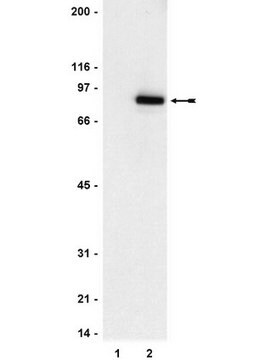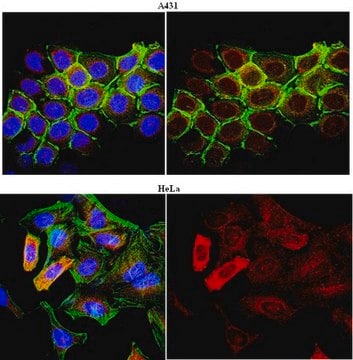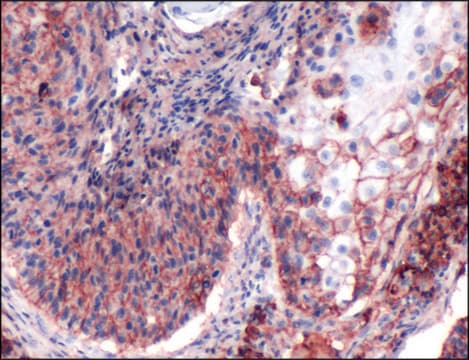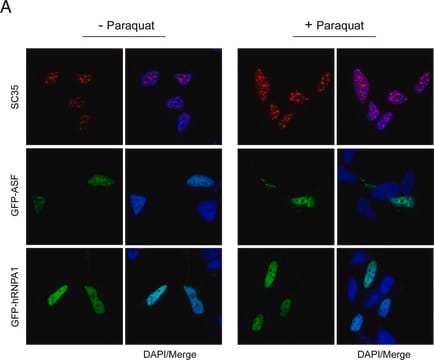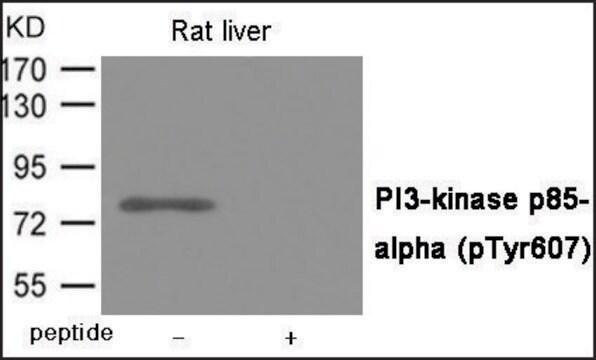06-596
Anti-STAT3 Antibody
Upstate®, from rabbit
Synonyme(s) :
Acute-phase response factor, DNA-binding protein APRF, signal transducer and activator of transcription, signal transducer and activator of transcription, (acute-phase response factor)
About This Item
Produits recommandés
Source biologique
rabbit
Niveau de qualité
Forme d'anticorps
purified immunoglobulin
Type de produit anticorps
primary antibodies
Clone
polyclonal
Espèces réactives
mouse, human, rat
Fabricant/nom de marque
Upstate®
Technique(s)
ChIP: suitable
electrophoretic mobility shift assay: suitable
immunocytochemistry: suitable
immunoprecipitation (IP): suitable
western blot: suitable
Isotype
IgG
Numéro d'accès NCBI
Numéro d'accès UniProt
Conditions d'expédition
wet ice
Modification post-traductionnelle de la cible
unmodified
Informations sur le gène
human ... STAT3(6774)
mouse ... Stat3(20848)
Description générale
Spécificité
Immunogène
Application
4 μg of a previous lot immunoprecipitated STAT3 from 500 μg of EGF-stimulated A431 RIPA lysate.
Gel Shift Assay:
An independent laboratory has reported that this antibody supershifts.
Immunocytochemistry:
10 μg/mL of a previous lot of this antibody showed positive immunostaining for STAT3 in A431 cells fixed with 95% ethanol, 5% acetic acid.
Epigenetics & Nuclear Function
Transcription Factors
Qualité
Western Blot Analysis:
0.5-2 μg/mL of this lot detected STAT3 in RIPA lysates from EGF stimulated human A431 cells and previously from mouse WEHI and rat L6.
Description de la cible
Liaison
Forme physique
Stockage et stabilité
Handling Recommendations: Upon first thaw, and prior to removing the cap, centrifuge the vial and gently mix the solution. Aliquot into microcentrifuge tubes and store at -20°C. Avoid repeated freeze/thaw cycles, which may damage IgG and affect product performance.
Remarque sur l'analyse
Positive Antigen Control: Catalog #12-302, EGF-stimulated A431 cell lysate. Add 2.5µL of 2-mercaptoethanol/100µL of lysate and boil for 5 minutes to reduce the preparation. Load 20µg of reduced lysate per lane for minigels.
Autres remarques
Informations légales
Clause de non-responsabilité
Not finding the right product?
Try our Outil de sélection de produits.
En option
Code de la classe de stockage
12 - Non Combustible Liquids
Classe de danger pour l'eau (WGK)
WGK 1
Point d'éclair (°F)
Not applicable
Point d'éclair (°C)
Not applicable
Certificats d'analyse (COA)
Recherchez un Certificats d'analyse (COA) en saisissant le numéro de lot du produit. Les numéros de lot figurent sur l'étiquette du produit après les mots "Lot" ou "Batch".
Déjà en possession de ce produit ?
Retrouvez la documentation relative aux produits que vous avez récemment achetés dans la Bibliothèque de documents.
Notre équipe de scientifiques dispose d'une expérience dans tous les secteurs de la recherche, notamment en sciences de la vie, science des matériaux, synthèse chimique, chromatographie, analyse et dans de nombreux autres domaines..
Contacter notre Service technique